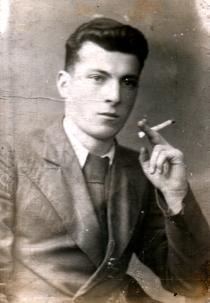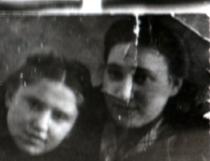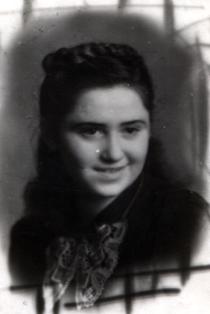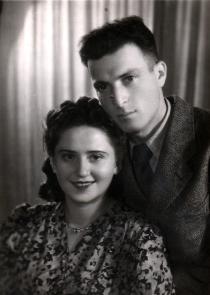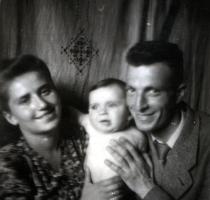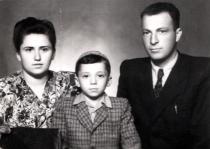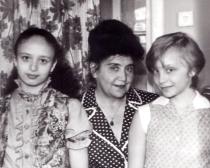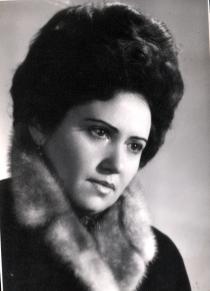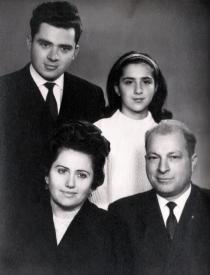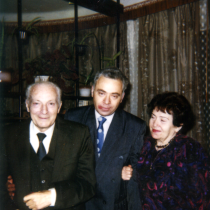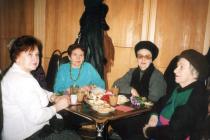I, Evgenia Krut, and my future husband Lev Gendler. This photo was taken in Sverdlovsk in 1945.
In the middle of June 1941 my summer vacations began. I finished the 7th grade at school. We never traveled. Our mother couldn't afford it. I was planning to meet with my friends, go swimming and hiking in the summer. At 12 o'clock on 22 June 1941 the radio announced that the war began.
When evacuation began in Novosokolniki authorized officials made rounds of people's houses knocking on their windows to tell them to come to the station. We took a small suitcase thinking that it was just for a week we were leaving, but it happened to be for good. We locked the doors taking our house register book and a head cap from my mother's sewing machine and left our home. None of us ever came back to the house. The war took away everything from us. There were five of us going: our mother, my sister, me, my mother’s sister Genia and her daughter. We reached Cherdyn, [550 km from Moscow] in Solikamsk. We were taken to a small village of Malotrifonnoye, Egorshyn district, Sverdlovsk region. The kolkhoz was called 'Red Partisan'. We got accommodation in an abandoned house. My mother and Genia's daughter stayed at home and Genia, my sister Lubov and I went to work in the kolkhoz. We worked in the field. We knew what to do since we had done similar work before. However, we had to work so hard that we couldn't stand on our feet from exhaustion. We were constantly hungry. Villagers were very poor, too. We also suffered from cold. We didn't have any winter clothes and the temperature dropped to - 40C. I don’t know how we survived.
In winter 1941 many people in Malotrifonnoye village began to die from hunger. My sister Elena lived in Sverdlovsk since 1938. My mother told me to go to Elena to save my life. I went to Sverdlovsk. The next day I went to the plant where my sister worked as an accountant and got a job there. I worked in a hazardous place at the plant. This was a military plant. My task was to test parts of planes with an indicator tool. I worked in the upper tier where poisonous gases were accumulating.
I met my future husband in Sverdlovsk. The plant where I worked was sponsoring a hospital where my future husband junior lieutenant of medical service Lev Gendler worked. He didn't impress me much. I didn't even think about love. I thought love was for a peaceful time and was quite out of place at wartimes. He invited me to the theater and then became to visit us at home. Finally he proposed to me. I was 18. I didn't say anything in response. In April 1945 Lev went to his parents in Kiev, but promised that he would be back for me.
I remember 9th May 1945 when the radio announced the capitulation of Germany and the end of the war. People came into the streets. They hugged and kissed greeting each other. In the evening we went to the central square to watch fireworks. We felt happy: the war was over and so was this horror of life. Lev was out of my mind. I thought it was just an adventure. On 31st December 1945 I received a telegram from Lev. He notified me that he was arriving. He came when we were sitting down to have a New Year dinner. Lev said he had come for me. We had a civil marriage in Sverdlovsk. We received food in our factory canteen for 3 days in advance: bread, soup and cereal and this made our wedding dinner. After the civil ceremony we ran home and had dinner with my sister and mother. Next day we left for Kiev.
There were two rooms and a kitchen in Lev's family's apartment. My husband and I lived in one room. Lev began to work as an engineer in the Ministry of Furniture Industry. My father-in-law helped me to get a job as human resource inspector at the Bolshevik Plant. I joined Komsomol at the plant. I obtained my Komsomol membership card at the Komsomol Committee of the plant. I believed it was an important step in my life.

